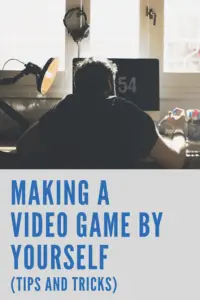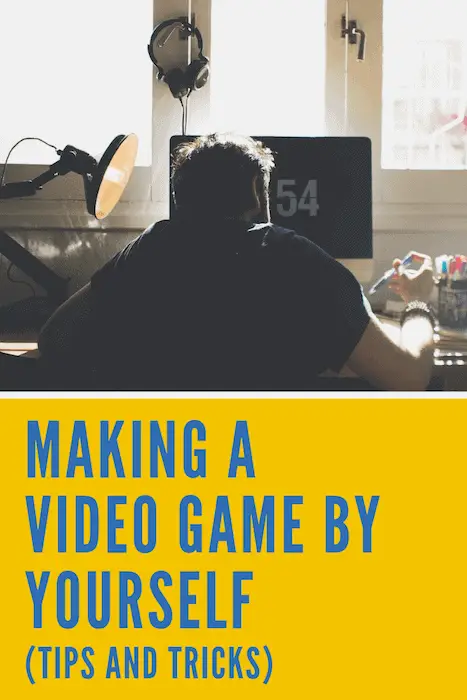Creating a video game by yourself is no small undertaking. You’ll be responsible for the story, game mechanics, sound design, and marketing. And that’s just to name a few. But despite all the work involved, it is possible to release a successful video game all on your own.
How can you make a video game by yourself? Here are the steps you’ll need to take:
-
- Determine how much you have to spend on your game
- Evaluate your skillset to ensure you’re equipped to make the video game you envision
- Determine your goals and research the market for your game
- Start with a simple but exciting video game
- Give yourself a deadline to finish your game
- Get feedback from friends and family about your game
- Develop your video game marketing strategy
Determine How Much You Have to Spend on Your Game
One of the first things to figure out if you plan on making and releasing a game is your budget. One way or another, making a video game is going to cost you in either time or money.
If you have a job, you might be okay financially, but the amount of time you’ll have to work on your game will be greatly limited.
If you decide to quit your job and focus on producing and releasing your game in the hopes that it’s a fiscal success, then you’re really upping the stakes for yourself. Especially if this is your first solo project and you don’t have prior success in the industry to bolster your confidence.
The goal then is to find a balance. If you’re determined to produce your game full time, my recommendation is to build up your savings enough so that you can cover your living expenses long enough for you to regain employment in the event that things don’t work out as planned.
If you plan on maintaining your job, you might consider reevaluating your expenses, getting rid of any excess, and then cutting back a day or two at work to allow you more time to do what you’re passionate about.
You can also check out funding options like Kickstarter or Patreon to help launch your game if finances are an issue. Many indie developers have seen successful launches by growing a base of supporters on these platforms.
Pouring yourself into a game to make money off of it always comes with a certain degree of risk. The key is to manage that risk, rather than avoid it altogether. The fastest way to make better games is to make mistakes and learn from them.
Evaluate Your Skillset to Ensure You’re Equipped to Make the Video Game You Envision
You might never feel 100 percent ready to tackle the project that you’ve been dreaming of making, but you shouldn’t let that hold you back. However, you do need to be reasonable when it comes to the skillset that you’ll need in order to create and launch a video game all by yourself.
Here are a few of the areas that you should be able to handle:
Video Game Graphics
What art style do you plan to have for your game? Do you have the ability to create the style you imagine, and if not, what other directions can you take your visuals?
Video Game Sound Design
Does your game require high-quality voice acting, sound effects, or an incredible soundtrack? Can you do these on your own or do you have the connections and resources to take care of these in other ways?
Video Game Coding
Do you plan on coding the game yourself? If so, do you know how to code at the level you’ll need, or do you plan on using a tool that allows you to create your game without coding?
Video Game Story Writing
Is your game story or narrative driven? Do you have the abilities to write a well-rounded story that your target audience will enjoy?
Video Game Marketing
Do you have expertise in marketing to pull off a successful launch? You can have the best game in the world, but if you lack the necessary skills to market it, then most of the people that would enjoy it will never even hear about it.
If you lack the expertise or finances to take care of any of the things mentioned above, it might be worth your time to study the areas where you’re lacking before launching straight into your project.
Thankfully, in this day and age, there’s no shortage of both paid and free online courses to help you learn what you need to know.
Determine Your Goals and Research the Market for Your Game
When it comes to working on a project for months on end, it’s good to have a goal from the very beginning. What does success look like for your game? Are you simply making a game because it’s something you’ve always wanted to do, so you’ll be happy no matter the “success” of the game?
Or are you trying to establish your name in the industry and create a game that connects with millions of people?
The answer to these questions should have an impact on the direction you take your game. If creating a game is just a personal project for you, you can make whatever game you want without thinking about what audience you want to reach or how marketable your game is.
If you’re trying to go head to head with larger video game studios or other successful indie developers, then you should conduct a lot of research before you start your project.
Find what’s working and what isn’t. Study other small games that failed and try to determine where they went wrong. Figure out your target demographic and weigh your game ideas against their preferences to see if you’re on the right track.
Being thorough in your research before starting work puts you in the best position to be successful when you finally release your game.
Start with a Simple But Exciting Video Game
A common mistake of many first-time game developers is taking on too much too soon. The best thing to do as a new developer is to start with a rudimentary game that you’re fairly confident you’ll be able to create without too many complications.
Even though you might choose something simple, you should still make it something you’re passionate about and interested in. If the development process ever becomes arduous, (which it almost always does at some point,) then your passion can be what helps you keep going.
For example, if you initially planned on making a massive game set in a 3D environment, consider translating your story into a sidescroller with pixel art.
If you’ve never developed a game by yourself before, creating any game is a success. As you improve your skills as a developer, you can gradually increase the complexity of what you’re creating until you’re able to release that huge game you’ve been dreaming of.
Give Yourself a Deadline to Finish Your Game
Working on a solo video game without a deadline is a dangerous game to play. That project you planned on finishing in a year could easily stretch into a 5-year project that you never feel is quite good enough to release.
The advantage of working in a large game studio is the competitive environment and deadlines. In this work environment, people finish their projects because they have to, and if they’re late too many times they run the risk of being fired for someone that can do things more efficiently.
Your challenge as a solo game developer is to create accountability and a sense of urgency that will help you finish your game before your hair turns grey.
One way to do this is by building up a following around your game and then announcing a firm release date. You don’t want to disappoint your audience, so you’ll hopefully have more drive to get things done.
If you have trouble getting things done, my best tip is blocking your time. Block off several hours throughout your day when you know you’re at your most productive to focus solely on working on your game. During this time, eliminate all other distractions.
My most productive time is in the morning. (It’s 7:00 am as I write this.) But yours might be in the middle of the night. Find what works for you and stay disciplined about setting aside the time you need to finish your game.
Get Feedback from Friends and Family About Your Game
When you’ve been working on a project for a long time, one of the most intimidating things to do is to finally unveil your work.
However, this is a vital step when creating a video game, and should happen sooner rather than later in your development process.
When you work on a project for a really long time, your view of it can start to become distorted. It’s like listening to your favorite song for 6 hours on repeat. At the end of those six hours, you’ll hear that song very differently than everyone else.
Taking a step back and getting fresh perspectives from friends and family will help you maintain the initial vision you had for your game. If possible, you should also get the feedback of people in your target demographic for the game since they’re the wants you want to cater towards.
Develop Your Video Game Marketing Strategy
Many solo game developers don’t even start thinking about marketing their game until it’s finished and ready for release, and this is a huge mistake.
As soon as you have a firm direction for your game, you should begin planning and implementing your marketing strategy. Here are a few things you might consider doing as a part of your strategy:
Research your target demographic.
Study marketing strategies catered specifically towards the people you want to play your game.
Meet your audience where they’re at.
This might mean creating a Twitter, Facebook, Reddit, Youtube, Twitch, or Instagram profile, and coming up with a content strategy to keep them informed and excited about your project.
Create a website to serve as a hub of information for your game.
Link your website to all of your social media accounts, add videos and screenshots of your game, add a detailed description of your game and what platforms it will be for, add a way for people to get in contact with you, and add a downloadable media kit for the press to use.
Create a developer blog or vlog.
Give people behind the scenes information about your development process. Invite them into the journey and reward them with early footage and photos of your game.
Try to get press coverage when you’re several months away from release.
Contact them via email and ask if they’re willing to write a piece or do a video covering your game. If they aren’t willing to make an entire article or video, ask if they can do a post on social media.
I hope this article has helped you gain some fresh insight and inspiration for creating a game by yourself. Thousands of people create and release games each year, so if they can do it, you can too.
You can get back to all of my recent articles by going here.


